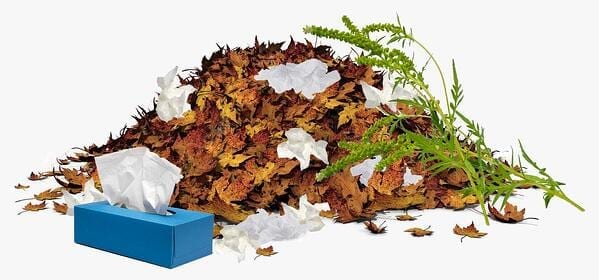For those of you feeling the effects of fall allergies, here are some tips to help you get through the seasons’ change.
- Leaves aren’t the only thing that get swept up in the autumn breeze. Keep windows in your home closed as much as possible to prevent drifting pollen from entering your home.
- The same goes for driving as pollen is easily stirred up on roadways. When traveling, roll your windows up to keep clean air in and pollen out of your vehicle.
- The days to be outdoors are when the pollen levels are lower; typically on rainy, cloudy and windless days. Save your yard work and outdoor activities for days like these so you can maximize your time outside and minimize your time sneezing!
- During and after gardening and raking leaves, be mindful to avoid touching your eyes and face. Plus, with flu season upon us, you’ll really want to keep your hands off your face!
- Just as pollen can collect on cars and windowsills, it easily collects on your hair and skin. Be sure to take a shower and change your clothes after spending time outside. This will also help you from transferring pollen onto your furniture and bedding.
Many people respond to nonprescription medications and treatments to help ease allergy symptoms including:
- Oral antihistamines.Antihistamines, such as Claritin, Zyrtec and Allegra, may help reduce sneezing, itching, a runny nose and watery eyes.
- Oral decongestants.Decongestants, such as Sudafed, can provide temporary relief from a stuffy, runny nose.
- Nasal sprays. When started before your symptoms begin, nasal sprays such as saline and steroids are often effective at easing allergy symptoms, and they generally have minimal side effects.
- Avoidance. Though this is easier said than done, avoiding allergens is the most effective way to manage symptoms.
If over-the-counter treatments aren’t enough to tackle your fall allergy symptoms, you may want to consider immunotherapy. Immunotherapy works to desensitize people to their allergens rather than using medication to cover up the symptoms. Allergen immunotherapy is administered and supervised by a physician who will determine the best type of immunotherapy whether it be allergy shots, sublingual drops, etc., and will create a dosing schedule and treatment plan individual to your specific needs. Over time, immunotherapy reduces the immune system reaction that causes symptoms.
If you regularly suffer from allergy symptoms or your symptoms interfere with your day to day activities, it’s best to schedule an appointment with an allergy specialist to evaluate your symptoms and discuss a treatment plan.
At Advanced Specialty Care, board certified Allergy and Asthma specialists can provide testing and treatment for seasonal, food, pet, insect allergies and more, as well as asthma. We have office locations throughout Fairfield and Litchfield County, CT in Danbury, New Milford, Norwalk and Ridgefield. If you have questions about your allergy symptoms or would like to schedule an appointment, please call our office at (203) 830-4700 or simply click here to fill out an appointment request form.
You May Also Be Interested In:
eBook: Do you have a cold or the flu? Know the difference.
Blog: Immunotherapy for Treating Your Allergies
Blog: Back to School: Prepare for that First Infection!

